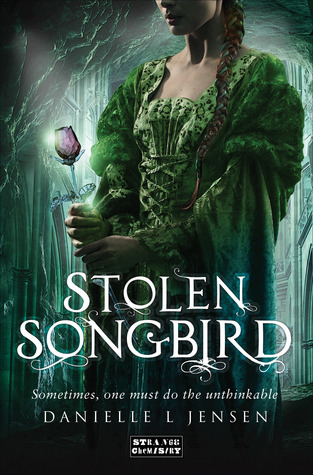Ah, trolls. They brood under bridges and over 4chan, and now they’ve found another home in pseudo-monarchical France, the setting of Stolen Songbird.
Cecile, a budding chanteuse, knows nothing of trolls as she prepares to leave her farm for the big city, to join her mother as a singer for the National Opera. But her dreams are put on hold when she’s kidnapped and sold to be a bride to the trolls, deep in the heart of a mountain where they are cursed to remain. The trolls believe she will free them, and marry her to their prince, Tristan, in a ceremony that leaves them both permanently in touch with the other’s emotions. Even so, Cecile plots her escape, and along the way comes across secrets upon secrets, revealing the trolls’ capacity for cruelty and for love.
Coming in at a bloated 480 pages, this book probably should have been edited down to about 300, and I know where she could have started: the romance. The contrived misunderstandings between two people who literally feel what the other person feels become unbelievable very quickly. I despise this notion that romantic parings must reach their culmination only at the end of the book; it makes for drama barely worthy of the name, and it makes chemistry so hard to maintain. If all it takes is one misunderstanding to create a huge fight, then what, exactly is making us think that they work?
For Tristan and Cecile, the attraction is in large part physical, which is another disappointment. The other trolls are malformed by human standards–the queen has a cojoined twin, Tristan’s friends are eight feet tall or are missing limbs or lack bilateral symmetry–but somehow, Tristan is a perfect physical specimen. As is Cecile’s romantic rival. It’s not that the characters should have to look a certain way, it’s more that this speaks again to the lack of chemistry between the leads. Jensen relies too heavily on their (decidedly un-steamy) physical attraction and not enough on their personalities. Cecile has been training to be a performer, and Tristan a king. Shouldn’t this create opportunities for them to reflect on their public vs. private personas, or clash over the necessity of the arts, or something other than their mutual secret boners? (Indie band name alert!)
The city is and its inhabitants would certainly offer any number of topics of conversation. There’s the slight issue of rebellion brewing, with non-pure-blooded trolls festering with malcontent under the heels of the pure-blooded aristocracy. Cecile makes strong connections with the downtrodden, as does Tristan, but unlike, say, the Hunger Games, the urgency isn’t there. There isn’t much urgency anywhere, in fact. The book’s goals and themes are muddled–it wants to be a tale of radical revolution but also working within the political system, freedom but also being tied to somewhere, of finding beauty but also the high cost of beauty. These aren’t bad aspirations, but Jensen can’t juggle them all, and ends up pulling her characters in too many directions, making them bland. Tristan does have glimmers of wit, and Cecile has flashes of fire. When forced to it, neither is bad at politics, but the politics are often occluded by layers of excessive fretting over do-you-like-me-y/n. They also have some talent with magic, but again, it’s overshadowed.
The magic system had potential–witches and trolls are part of a rich magical tradition that could have played beautifully here–but fizzled for me once it was made clear that it was based on the five elements, and only nominally so. Jensen simply didn’t have anything new to offer on that well-trodden ground. There was also the matter of Cecile’s singing, which came into play very early but never went very far. I kept wishing Brandon Sanderson could get his hands on this and make a system based on octaves, scales, and keys. Or that I was reading Seraphina, in which music was such an ever-present part of the character’s life and way of relating to the world, rather than just a bit of flavor in dire moments.
This is meant to be the first book in a trilogy, but it’s a toss-up as to whether I’ll move on to the second volume. There are some elements I would be sad not to see resolved (the witch’s story, the fate of the rebellion), but other things that I can feel making my eyes glaze over already (more “tests” of their love, scheming villains who aren’t very scary). There’s a lot of good YA Fantasy and Sci-Fi out there, and Jensen will have to refine her storytelling if she wants to compete.
Conclusion: 2/5, potential gone flat.

